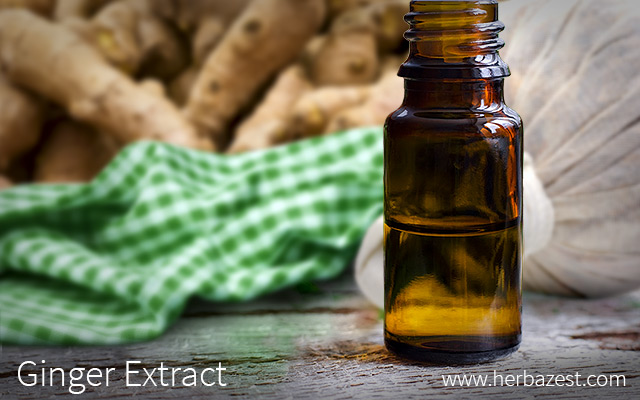Ginger is one of the most frequently-consumed spices in the world and a staple in a lot of Asian cuisine. However, as the use of natural and alternative medicine has increased in recent years, there has been a growing interest in the different uses and effects of ginger extract. While history has long recorded the medicinal uses of ginger, modern science has confirmed its anti-inflammatory, anti-emetic, and antispasmodic effects.
How to Make Ginger Extract
Extracts can be done using alcohol or glycerin as carrier substances. The following is an easy way to obtain ginger extract without any complicated equipment. The necessary items are:
- Fresh, raw ginger
- Boiling water
- Vegetable glycerin
- A dry, clean glass container
- Place the peeled and finely chopped fresh ginger in a glass container. Fill it within a few inches of the top.
- Pour half a cup of boiling water over the ginger.
- Add vegetable glycerin up to few inches from the top and cover the glass container with a lid.
- Place the container in a crockpot with a towel at the bottom to prevent the glass from breaking.
- Fill the crockpot with water and turn it on at minimum heat. In order to maintain the low temperature, it is better not to cover the crockpot.
- Take off the lid of the container once a day and stir the preparation to allow the ginger root to release its compounds.
- As it evaporates, keep adding water to maintain the same level for around three days.
- On the third day, remove the glass container from the crockpot and strain the contents in a bowl using a cloth. Wring the cloth very well to extract the last drop.
- Transfer to a dark glass container and store it in a cool, dark cabinet.
Under the right conditions, this preparation will a have a shelf life of two to three years. However, in order to reduce the risk of bacterial contamination, your ginger extract can be stored in the fridge.
Another way of making ginger extract is covering the chopped fresh root with a mixture of water and at least 55% glycerin, combining very well, putting on a lid, and letting it macerate in a dark, cool place for a period of four to six weeks. After that period, strain and store as described above.
Ginger Extract Benefits
The most prominent medicinal effects that can be gained by taking ginger extract include the following:
Anti-inflammatory effects. The long history of use of ginger for inflammation supports its efficacy in soothing headaches and migraines. Because of its widely-accepted anti-inflammatory actions, there has been great interest in the effects of ginger extract on treating arthritis.
Antiemetic and antispasmodic effects. Because of the super-concentrated levels of gingerols present in the herb, the use of ginger for upset stomach includes alleviating nausea and vomiting, among other related issues. Ginger extract may significantly reduce morning sickness in women who are less than 20 weeks pregnant. Research has also suggested that ginger may be effective in reducing the severity and duration of chemotherapy-induced gastrointestinal symptoms.
Ginger extract offers many health benefits, but it should always be used with caution. Be sure to discuss the potential risks of taking ginger with your doctor. Ginger extract is a very useful preparation that requires time and the right tools, but if taken properly, can be useful in relieving various common health issues.
Sources
- BOTEC Analysis Corporation
- Herbal Medicine: Biomolecular and Clinical Aspects, Chapter 7, The Amazing and Mighty Ginger
- National Institutes of Health, Ginger
- Osteoarthritis and Cartilage, A randomized, placebo-controlled, cross-over study of ginger extracts and Ibuprofen in osteoarthritis, 2000
- The Australian & New Zealand Journal of Obstetrics & Gynaecology, Effect of a ginger extract on pregnancy-induced nausea: A randomized controlled trial, 2003
- The British Journal of Nutrition, Benefits of whole ginger extract in prostate cancer, 2011
- The Soap and Detergent Association, Glycerine: an overview, 1990
- University of Maryland Medical Center, Ginger




